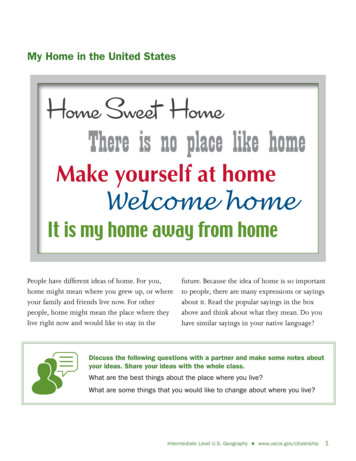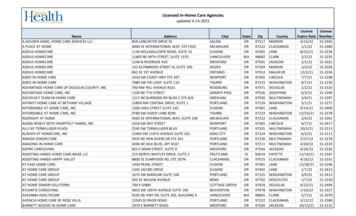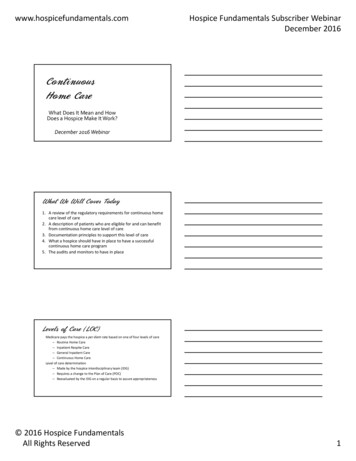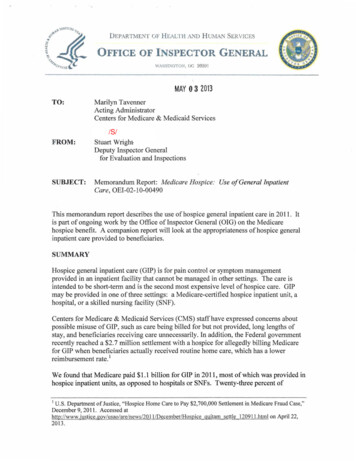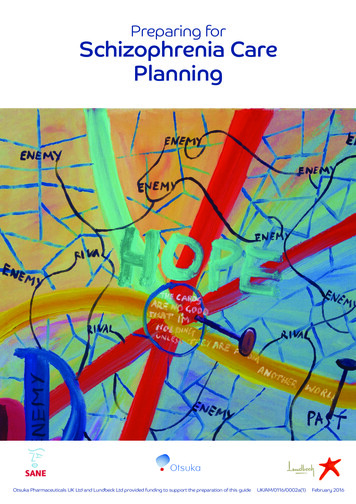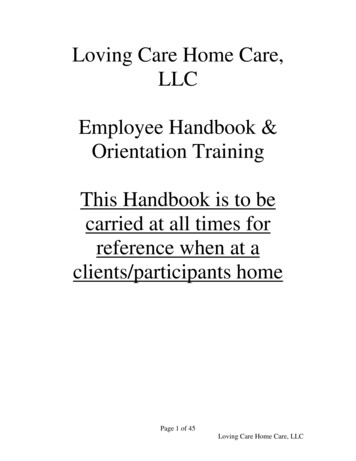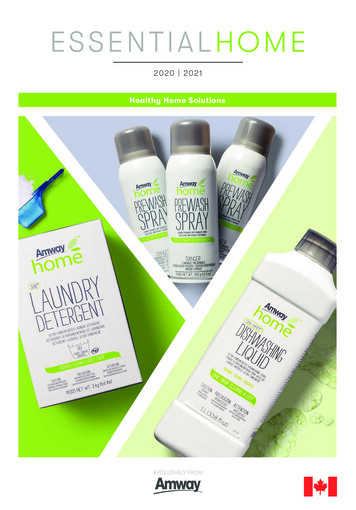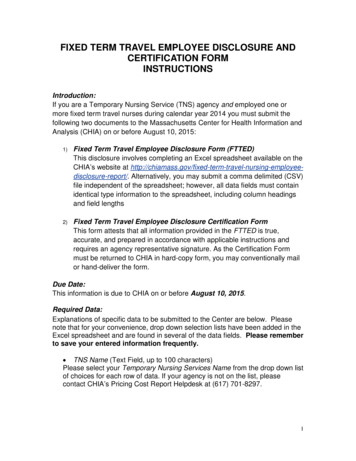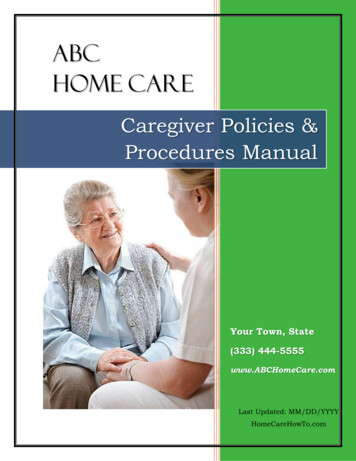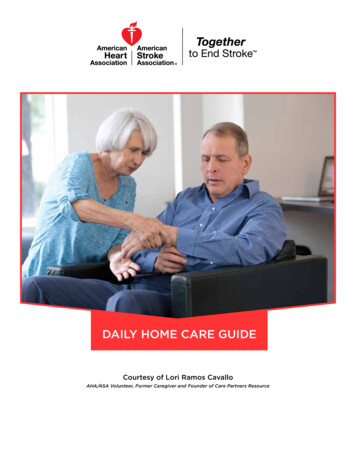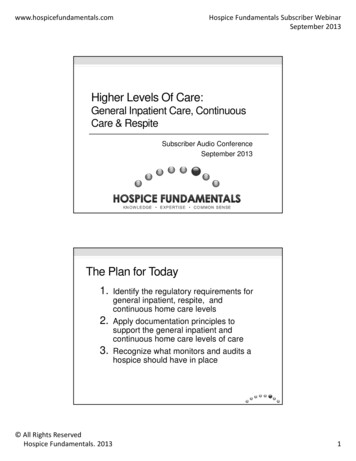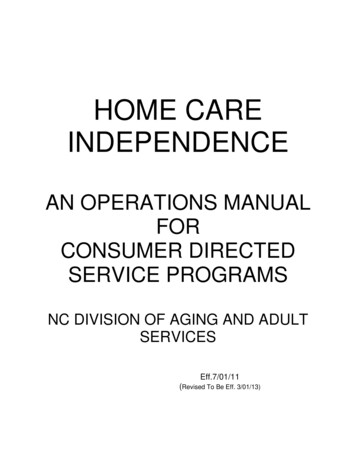
Transcription
HOME CAREINDEPENDENCEAN OPERATIONS MANUALFORCONSUMER DIRECTEDSERVICE PROGRAMSNC DIVISION OF AGING AND ADULTSERVICESEff.7/01/11(Revised To Be Eff. 3/01/13)
HCI Operations ManualTable of Contents:Section 1Introduction1Description of Consumer Directed Service2Goal of Home Care Independence2Enrollment Process3Home Care Independence Team7Participant7Representative8Care Advisor9Personal Assistant15Provider of Fiscal Management Services17Area Agencies on Aging21Division of Aging and Adult Services22Changes in Status of Participants22Hospitalization or Rehabilitation Services22Permanent Address Changes23Voluntary Disenrollment23Involuntary Disenrollment24Family Vacation25Standard Program Requirements25Criminal Background Checks25Appeals25Reporting of Abuse25Retention of Records26Consumer Contributions26Quality Management26Aging Resources Management System (ARMS)28Section IIAppendix (inclusive of Forms used in HCI)30
HCI Operations ManualHOME CARE INDEPENDENCE OPERATIONS MANUALNC Division of Aging and Adult ServicesSECTION I: OPERATIONAL PROCEDURES FOR HOMECARE INDEPENDENCE PROGRAMS (CONSUMERDIRECTED SERVICES)INTRODUCTIONPersons who are disabled by virtue of advanced age, illness, injuries, or congenital birthdefects have a basic and strong desire to manage their lives and needs with as minimalassistance from others as possible. Where feasible and practical, based upon anumber of factors, individuals who do need assistance from others should have the rightto direct as much of their activities of daily living as their condition and familycircumstances will allow. Public funds for the support of needed services to help withsuch activities should be flexible, allowing individuals or their responsible familymembers who want and are able to do so to determine what services they need, whenthey need them, and who will provide them. Services should be provided in such amanner that individuals derive physical and mental benefits that are personallysatisfying and consoling to them during periods of both vulnerability as well asnormalcy.The commitment of the Division of Aging and Adult Services (DAAS) to the concept ofConsumer Directed Service (CDS) grew out of participation in work groups relative tothe Real Choice Grant that was awarded to the Department of Health and HumanServices (DHHS) in 2001. A major emphasis of this grant was to create a system ofhome and community based care that emphasizes, encourages, and enablesconsumers to have more direct control and influence over needed services and howthese services will be provided. This is a very different system of service from thetraditional home and community care service system that is largely controlled byprofessionals and rules and regulations regarding how services are attained andprovided. Home Care Independence is the name adopted for the DAAS CDS programsupported with Home and Community Care Block Grant funds. (As the programmatures, additional sources of support will be identified)The following principles should guide the creation of DAAS funded Consumer Directedprograms: Older adults have the right to choice and self-determinationPerson-centered service plans should reflect the views of older adultsregarding their wants and needs1
HCI Operations Manual The strengths of the person from a holistic standpoint are critical whenconsidering consumer direction as the way of enabling independence in thehome settingConsumer direction of services should be put together in such a manner thatolder and disabled adults opting for this approach to service are protectedfrom physical or mental harm from others.DESCRIPTION OF CONSUMER DIRECTED SERVICEConsumer Directed Service available through local community agencies that receiveDAAS funding for support of services to the aging is a method of service delivery thatpromotes and enables the consumer (called a Participant) to recruit, hire, train,supervise, and, when necessary, terminate the employment of chosen PersonalAssistants who provide them personal and home management services in their homesettings. Participants in CDS programs may also select vendors of other goods,equipment, and services that may be needed for their care and well-being. They arenot required to select vendors who have been pre-approved by the state or localgovernmental units. The one exception to this will be the statewide Fiscal ManagementService (FMS) selected by DHHS to provide payroll services in behalf of Participants fortheir Personal Assistants.In North Carolina, CDS, under the auspices of DAAS, enables Participants to take on allmanagement activities with paid caregivers called Personal Assistants, with theexception of paying their salaries and other payroll related tasks. This aspect of workeremployment is handled by the FMS that has been selected by DHHS for this purpose.Participants are required to use the payroll services of the FMS if they choose toparticipate in Consumer Directed Service funded with Home and Community Care BlockGrant (HCCBG) or other DAAS funds that may be made available for the creation ofCDS programs. Overall responsibility for the FMS contract with DHHS has beendelegated to the Division of Medical Assistance (DMA). Each participating division willhave a designated staff person to oversee the CDS program set up by that division.This person will work with the person designated in DMA for overall management of theFMS contract to resolve issues that may arise and have some relevance to all divisions.DAAS designates the monitoring of local programs supported with HCCBG funds to therelevant Area Agency on Aging (AAA) that will also provide technical assistance to localCDS program in cooperation with the designated DAAS staff person.Goal of HOME CARE INDEPENDENCEThe goal of Home Care Independence, which is the name given to the program forconsumer directed services offered by DAAS, is the establishment of home andcommunity based consumer directed programs of service within communities that wantto offer consumers more control over how, when, and by whom their care needs aremet in their home settings. DAAS will provide overall direction for the program as itdevelops in communities all across the state. This will include the initial and2
HCI Operations Manualsubsequent training for the staffs AAAs and for local agencies in counties where there isinterest in establishing CDS programs. DAAS and the AAAs will provide technicalassistance and monitor the activities of agencies to help assure the integrity of the CDSprograms as they begin to develop and operate within counties. Funding for HomeCare Independence will come primarily from HCCBG allocations to counties. As is truefor all services funded with HCCBG, the decision to provide CDS in a county isdetermined in the annual county planning process through the work of county planningcommittees and with final approval by the Board of County Commissioners.ENROLLMENT PROCESS FOR CDSTo be an eligible participant for Home Care Independence, a consumer must be: 60 years of age or older Unable to carry out at least two tasks essential to the activities of daily living(ADLs) or instrumental activities of daily living (IADLs) that do not indicate theneed for nursing home or other facility care, thus enabling them to remain in thehome setting Willing to participate in Home Care Independence and understands the rights,risks, and responsibilities of managing their own care with a budget of publicfunds Able to make decisions regarding:o employment and the direct activities of caregivers with no or limited input fromothers oro the choice of someone to act as their Representative in securing and directingcaregiver activities and Willing to assure that employees are paid in a timely manner and to workcooperatively with the FMS appointed to provide this service for local Home CareIndependence programsThe agency making Home Care Independence available must screen for HCCBGeligibility using DAAS Form 101. Once this screening has determined the person iseligible for HCCBG service assistance, the specific needs must be assessed using theforms listed in the Appendix to this Manual. The assessment process must address thefollowing: The person is not a current consumer of other more appropriate CDS programssuch as CAP Choice, the CDS program of Mental Health, or the IndependentLiving Program of Vocational Rehabilitation The individual’s health concerns The housing and living arrangements and income of the individual The individual’s cognitive functioning and perception of his/her well-being Availability of caregiver support (paid or unpaid) How daily functioning needs (ADLs and IADLs) currently are being met3
HCI Operations Manual How the person perceives his need for assistance, what he wants, and how hewants it deliveredWhat, if any, services currently are being received by the individualThe person appears to have the ability either to self-direct care, has someonewho can act in this capacity for him/her, or needs to identify someone who canperform this functionActivities of eligibility determination should include information to assure that allpotential Participants interested in home care assistance will have the option ofconsidering CDS as the program to meet their home care needs. Eligibility screeningbegins the process of determining whether or not they have a good understanding ofthe rights, risks, and responsibilities of self-management. The person interested in CDSmay designate a Representative to handle the responsibilities of managing their care.The probability of enrolling appropriate and successful individuals is greatly enhanced insituations where the potential Participant needs assistance and is willing for a trustedfriend or relative to make decisions in his/her behalf; however, not all prospectiveCDS Participants will need or require a Representative to act in their behalf. Thisis not a position that requires the person to be legally appointed, although someone whohas Power of Attorney or is a legal guardian may act in this capacity.Enrollees in Home Care Independence become “Participants.” Home CareIndependence is not intended to be an alternative program to nursing home placement.HCCBG funds are not to be used to pay for goods and other non-Personal Assistantservices that the individual is eligible for in some other program (i.e., durable medicalequipment available through Medicaid or Medicare or through a private or work-relatedhealth care plan). North Carolina assures all Participants and their paid caregivers,called Personal Assistants, of non-discrimination and equal opportunity in compliancewith all applicable Federal laws, regulations, Executive Orders and Civil Rights rules orregulations and laws of Equal Opportunity and Affirmative Action. Both will be providedBill of Rights documents that address aspects of their relationships with one another.These are in included in the Appendix to this manual.When it is determined that the potential Participant needs specific service assistanceand is interested in the Home Care Independence program, the following should beexplained or provided to them: A discussion with the person about CDS to facilitate the participant using thisservice approach appropriatelyA discussion with the person who may need assistance in using the service thathe/she may appoint someone to serve as their Representative in making careneed decisions and in managing employees who will provide direct servicesInformation that the state has secured payroll and related services from an FMSthat will provide this assistance to all Participants who enroll in the CDS programInformation by the provider agency about other services available in thecommunity and provided assistance, if needed, in seeking out other sources ofhelp for those who do not proceed with CDS4
HCI Operations ManualThe Home Care Independence Agency will maintain records and document therequests for service. The following documents must be included in the file on eachParticipant:1. The DAAS 1012. The Self-Assessment Form completed by the potential Participant3. The agency Service Assessment/Reassessment Form* for identification of needcompleted by the Care Advisor4. Forms related to appointment of Representative* when applicable5. The Participant Enrollment Form6. The Care Plan and Budget for assistance completed together by Participant andCare Advisor7. The Back Up Plan for assistance8. Dated notes of contacts with Participants9. All forms related to referral and future updates submitted to the FMS by CareAdvisor10. Participant Bill of Rights form signed by all who are required11. A copy of the Criminal Background Report from the FMS12. Annual forms completed during reassessment of continuing eligibility and needfor CDS*NOTE: .If an agency has a Service Assessment Form that collects the same informationas the DAAS CDS/ Assessment/Reassessment Form; they may use the local form.The following are the steps for enrolling and maintaining an individual in the CDSprogram.The Care Advisor of the CDS provider agency will perform the following, usingdocuments contained in the Appendix to this manual: Determine eligibility for HCCBG using DAAS Form 101. Determine potential of individual to self direct care using DAAS Form 101,comments by the Participant recorded on the Participant Self-assessment Formand the Care Advisor’s observations of the person when discussing CDS withthem. Assess individual’s need for personal care and home management assistanceusing the Participant Self-Assessment Form and the Service Assessment Form. If needed, engage with the Participant in Choosing a Representative using theAppointment of Representative Form. Enroll Participant for CDS using Participant Enrollment Form. Engage with the Participant in completing Consumer Directed Services Plan ofCare/Budget Form and the Back Up Plan for Consumer Directed Services Form. Notify FMS of new CDS Participant and hours of weekly service authorized inaddition to any vendor services for which the FMS is authorized to makepayment using the FMS Authorization Form.5
HCI Operations Manual Provide the Participant an Employment Application and Criminal Record ConsentForm for Participants to use in selecting employees. Offer guidance to the Participant in choosing Personal Assistants if this isrequested. Provide the individual the Participant Employer Bill of Rights document. Review records of Criminal Background checks, conducted by the FMS, with theParticipant. Those whose background records reflect the convictions specified inthe Criminal Background Check Policy included in the Appendix to this manualmay not be hired. Participant makes the ultimate hiring decision regardingapplicants who are eligible for hire. Notify the FMS if changes in service hours, vendor services, or any otherchanges are needed for a Participant, using the FMS Change Order Form. Be available to assist the Participant and FMS if payroll issues arise to assurethat Personal Assistants are paid properly. Contact Participant per time frames and as specified in the manual Maintain forms and dictation in individual Participant files Be involved with the Participant as an advisor rather than as a manager of careThe FMS will perform the following tasks relative to the DAAS CDS program: Contact a new Participant upon notification from the Care Advisor to begin theenrollment process for payroll service Complete all necessary federal and state tax paperwork and other documentsrequired for provision of payroll assistance Discuss the role of the Participant as the “Employer of Record” Perform Criminal Background checks for the Participant for potential PersonalAssistant applicants but will not make a recommendation regarding the findings. Send Criminal Background reports to both the Participant and the Care Advisorfor their review and decision to hire Enroll Personal Assistants for payroll services when the Participant selects aworker .the initial Personal Assistant unit rate for start up programs is 10.87 Review time sheets submitted by Personal Assistants per the authorization ofhours submitted by the Care Advisor Resolve issues of recorded hours worked by Personal Assistants if there are twoconsecutive payroll periods when hours worked are 10% or more than the hoursauthorized Pay Personal Assistants twice per month per the FMS payroll schedule Submit payroll hours and FMS initial and monthly administration fees directly toARMS May also submit other goods and services to ARMS (Aging ResourcesManagement System) if authorized by the Care Advisor to do so. Participantwould pay for the goods and then submit receipts of payments made to vendorsto the FMS for submission to ARMS for reimbursement. The AAA would enablethe FMS to enter reimbursement requests to ARMS for other services provided toParticipants6
HCI Operations Manual Stress to Participants and to Personal Assistants that consistently late orincorrect Time Sheets submitted will result in salary checks not being issued untilthe next pay period. Reconcile on a quarterly basis, at the end of the third month of a calendar quarter(September, December, March, June) all reimbursement payments received perroutine HCCBG procedures for hours of payroll service provided for Participantsof each local provider agency to determine the average current PersonalAssistant unit rate for the period for that agency .every reconciliation covers all units retroactive the beginning of the fiscal year. Pay all taxes and other payroll related expenses required by law per thetimetable of respective governmental entities for both the Participants andPersonal Assistants Provide payroll reports to the Participant and the local provider agency Provide a secure web site where payroll reports and other reports will beavailable for review by the provider agency, the AAA, and the state DAAS usingpassword protected IDsNOTE: When a local provider begins to provide CDS, the FMS and the local provideragency will complete a Memorandum of Agreement that specifies the responsibilities ofeach in the service and payroll process for individuals enrolled as Participants in theconsumer directed program.HOME CARE INDEPENDENCE TEAMPARTICIPANTA Participant is: A consumer who needs assistance in performing routine and incidental activitiesof daily living 60 years of age or older and needs the direct assistance of another person Someone who expresses an interest in CDS and is assessed as having thecapability to employ and manage the work of providers and self-direct the carereceived or has someone who is willing to do this in their behalf The “Employer of Record” of all workers hired as their Personal Assistants. Someone who does not have nursing home care needs and for whom the cost ofmeeting their needs does not exceed the maximum monthly allowable by thelocal provider agency for participation in Home Care Independence.NOTE: An agency providing Home Care Independence should not automaticallybudget the maximum allowable by the agency for each Participant unless theassessment indicates that the maximum is needed. Ultimate decision regarding themaximum allowable monthly budget is at the discretion of the local provider agencybased upon the total HCCBG and local funds allocated to the CDS program.7
HCI Operations ManualREPRESENTATIVEA Representative is someone who makes decisions for a Participant when the person isunable due to mental or physical impairments to fulfill the tasks of an employer ofsomeone providing direct care assistance. A Representative will be required for anyParticipant who is determined during the assessment for service process as unable: to understand his/her own personal care needs to make decisions about his/her own care to recruit, hire, train, direct, and supervise Personal Assistantsor has a court appointed legal guardian who may act in this capacityA Representative may need to be identified at any time it is noted by professionalsworking with the family or by other family members that the Participant is less and lessmentally or physically able to handle all that is involved in CDS. The voluntaryappointment of a Representative by the individual is far preferable than taking legalaction at a time when mental faculties have deteriorated and the person is declaredincompetent. Family members as well as friends may serve as Representatives.Selection of a non-legal Representative is not intended to be a laborious process butone that an informal negotiation involving the Participant and someone they may wantto serve them in this capacity. The Home Care Independence staff person shouldparticipate in the discussion as deemed appropriate, particularly in situation where theParticipant has mental disabilities or a history of being unable to mange personalfinances. Selection of a Representative by the Participant in concert with other familymembers will help to assure that Home Care Independence is an experience thatenables the Participant to have continued involvement in determining personal wantsand needs to the fullest extent possible.Traits of a good Representative would be reflected in: Behaviors that indicate a personal commitment to the Participant’s well-beingGood rapport with the Participant when interacting and communicating with himor herExpressed knowledge about the Participant's preferencesRegular and frequent contact with the ParticipantExpressed willingness of complying with the responsibilities of the Participant asthe Employer of RecordGeneral, non-confrontational, consensus from other family members that theperson would fulfill the role adequatelyMay have been an unpaid caregiver and now requires respite from this roleBehaviors that do not reflect discernable abuse of alcohol or drugsA reputation for not having a history of physical, mental or financial abuseAnyone who serves as a Representative must be no younger than 18 years of age andcannot also serve as the paid caregiver of the Participant.8
HCI Operations ManualNOTE: If someone serves as a Representative for a Participant, this person may not alsobe employed as a paid caregiver for the Participant.CARE ADVISORCare Advisors are representatives of Home Care Independence programs and assesswith CDS applicants their potential for participation in the self-directed care program.They work with them to explain the program and all that is involved with consumerdirection of care. They provide information that will help individuals to determine if theywant to engage in the employment of their direct care workers. They also engage withindividuals to identify specific care needs and how these needs may be addressed.The initial and on-going contacts between the Care Advisor and a consumer/Participantand/or Representative will enable: Attention to be focused on assessment of need for service and how best to meetthese needsDetermination that the person has the aptitude for self-directing his/her own careand for dealing with issues that arise in this processUnderstanding of Home Care Independence and what is involved in theemployment of direct care workersHelping Participant to determine plans of care that specifies services to addressthe needsHelping Participant to develop budgets and any modifications that are warrantedfor the cost of services, within limitations of the local maximum allowed budgets,for Home Care IndependenceAssistance in securing a Representative for the Participant should the need forone be determined at any pointHelp or advice to be provided, if needed, when the process of locating andemploying Personal Assistants beginsHelp to be provided the Participant ,if needed, in accessing other communityservicesThe State Department of Health and Human Services (DHHS) has established acontractual agreement with a statewide FMS for payroll services for Participants in CDSprograms in all local agencies operating under the auspices of one of the Divisions ofDHHS. When a Participant hires a Personal Assistant, the Care Advisor will refer theParticipant to the FMS for payroll services. Payroll service for Participants in CDSprograms cannot begin until the Participant is enrolled with the FMS. The form forauthorizing the FMS to enroll a Participant for assistance is included in the Appendix.After the Participant is approved for CDS in the Home Care Independence program andthe payroll process is functioning, Care Advisors will establish periods of contact withthe Participant to monitor the quality of self-directed care, to provide support and9
HCI Operations Manualassistance as indicated and to assure that essential needs of Participants are beingmet. These contacts at a minimum are as follows: At least one telephone call and one in home visit within the first month thatthe Participant is accepted into the program and receives assistance fromtheir Personal Assistance.Two additional home visits during the first year of serviceA quarterly telephone call for the purpose of monitoring the provision ofassistance by the Personal AssistantOther contacts as needed or requested by the Participant or deemednecessary by the Care AdvisorA complete annual reassessment for service on or before the one yearanniversary date of enrollment to CDS and every year thereafterAfter year one of service, quarterly telephone calls and at least two homevisits during the twelve month period.Participants should be advised that calls to the Care Advisors for help and advice canbe made at any time that the Participant feels the need for assistance or has concernsrelative to consumer directed services. Care Advisors will not function in the takecharge approach attributable to care managers in the traditional agency-provider careprogram. They will allow the Participant to make decisions regarding when and howthey want service to be provided by their Personal Assistant. When the Participantseeks guidance, the Care Advisor should be available to offer advice and information.They should function as advisors to Participants and should engage in problem-solvingactivities if requested by the Participant. If it seems that the Participant is experiencingstress and concerns in the process of being served by a Personal Assistant or inworking with the FMS, the Care Advisor should acknowledge this with the Participantand offer to be of assistance. All contacts made with Participants, Personal Assistants,and the FMS will be documented and dated in a case file maintained on eachParticipant by the Care Advisor.Specific Care Advisor duties in Home Care Independence include: Service Marketing and Orientationo Marketing: Care Advisors can help market Home Care Independence incommunities to the public at large and to potential consumers in particular.Examples of marketing activities might include: distribution of informationbrochures, presentations to groups, public service announcements,newsletter articles, one-on-one contacts, etc.o Orientation: Care Advisors should provide information to individuals whoinquire about the Home Care Independence program. This would be providedprior to screening for eligibility and assessment of the need for assistance.The process should include at a minimum: an overview of the concept ofCDS; and of the FMS component; ways of recruiting, interviewing, hiring,supervising, and even terminating Personal Assistants. The person needs to10
HCI Operations Manualunderstand that they become the employer of workers that will provide themthe services that they need in their homes. Specific Needs Screening and AssessmentEach consumer must be initially screened for eligibility for service per HCCBGrequirements using the DAAS Form 101. This initial screening also will givesome indication of the person’s care needs, the desire to self direct care, and theability to direct the activities of a Personal Assistant. It will identify whether or notthe person is already a consumer of another CDS program such CAP Choice,Independent Living, or consumer directed respite programs for family caregivers.It will reveal how needs are currently being met and what help the personperceives he/she needs.The screening activities and the assessment for specific service needs may bethought of as one flowing process to determine whether or not the person meetsthe criteria for the funding source and has needs that can be met in the homesetting. For Home Care Independence, the process determines that the personhas abilities to self-direct care, has someone who can do this in their behalf, orneeds assistance to find someone to act in this capacity. This process involvesthe self-assessment by individuals and the assessment completed by the Careadvisor. Once the person is determined eligible for program participation and isenrolled as a Participant, the on-going assessment of the continuing need forservice and the continuing ability to self-direct service must be fully reassessedno less than annually thereafter. The initial assessment and subsequentreassessments are joint processes involving both the Participant and the CareAdvisor. The process of assessment is critical to the determination of specificneeds and how best to meet the needs. The Participant and/or theirRepresentative take the lead in the needs assessment. The full reassessmentfor continuing in CDS must be completed on or before the end of the twelvemonth period from the date of the original assessment and subsequentreassessments.NOTE: The DAAS Form 101 for eligibility screening will be used in concert withthe Participant Self-Assessment and the Assessment/Reassessment formsincluded in the Appendix to this Operations Manual for the purpose of initial andon-going assessment of need for service Plan of Care and Service BudgetEach participant in the CDS program must have a written Plan of Care (POC)and a monthly Service Budget for carrying out the plan. The Plan of Careindicates all of the serv
Services (DHHS) in 2001. A major emphasis of this grant was to create a system of home and community based care that emphasizes, encourages, and enables consumers to have more direct control and influence over needed services and how these services will be prov
